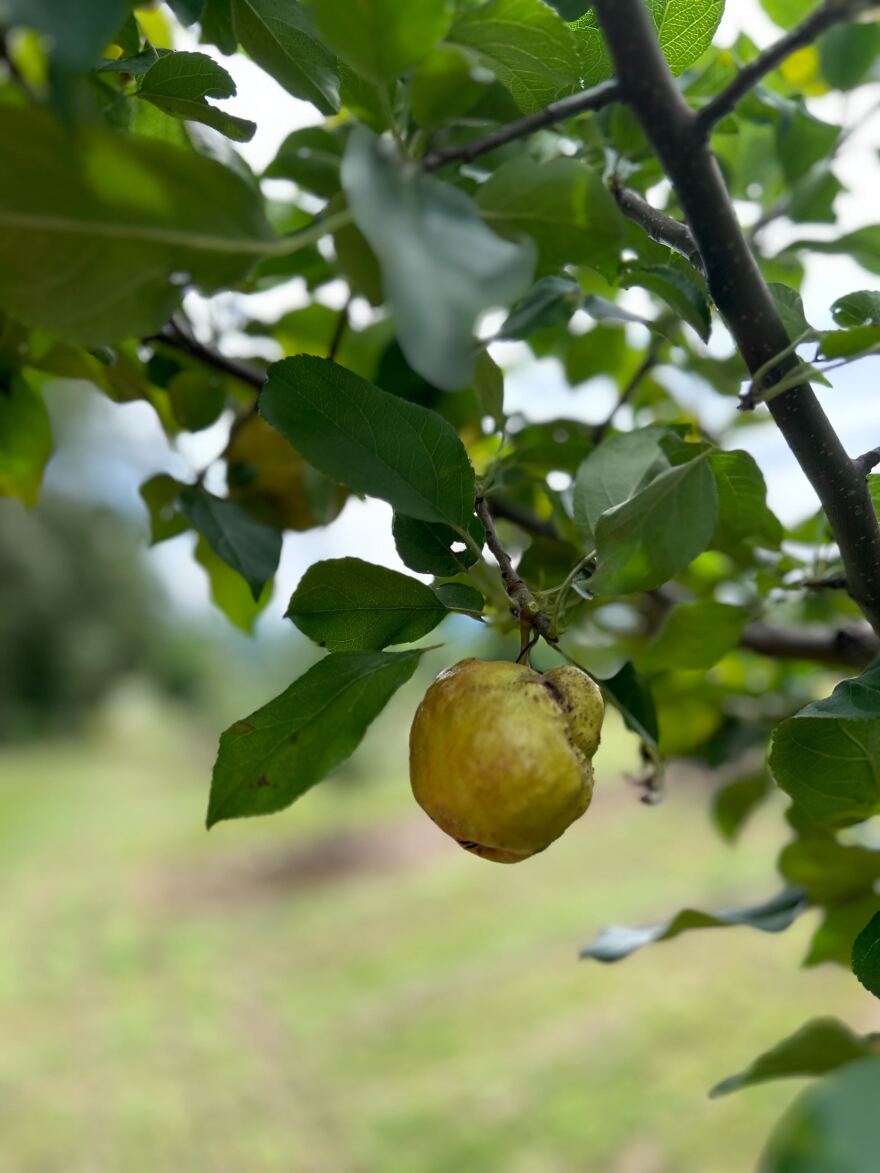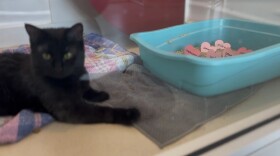It was about 10:30 p.m. when Chuck and Diane Southers' alarm went off, on a Thursday night in May. This thermal alarm takes the temperature out in the apple orchard and rings a phone if it dips too low. That spring night, it was about 35 degrees.
The Southers' orchard had been in full bloom, which is normal for mid-May. And this year’s was looking particularly good.
“We called it a popcorn bloom,” Diane Souther said. “The tree was just white with flowers.”
As the temperature kept dropping, Chuck Souther tried to stop the fruit from freezing. He turned on a wind machine, which circulates warmer air that rises through the orchard. But it was too cold for too long, he said. By the next morning, all the white petals were turning brown. Chuck and Diane started cutting open baby apples, smaller than a pencil eraser. They already had some sap.
“That water expands when it freezes and when it freezes, it expands and destroys that cell and destroys the seeds,” Chuck said. “No seeds, no apples.”
Apple picking at places like Chuck and Diane’s farm, called Apple Hill, is a quintessential New England fall tradition. But a good harvest depends on things that happen months before. This year, many farms have no fruit at all because of that freezing night in mid-May. As our climate warms,and alters growing conditions, farmers are dealing with increasing uncertainty about their crops.

Some farms still had a good crop, especially those at higher elevations. But the director of the state’s Farm Services Agency, Jeffery Holmes, says this year was unprecedented. Hundreds of acres of crops froze during two big cold snaps: first peaches in February, and then apples in May.
Read more: New Hampshire farmers can apply for USDA natural disaster aid for May freeze
“There’s something every year that seems to be abnormal in the long-range scope of things,” he said. “But maybe it’s a new normal, unfortunately.”
Chuck Souther said he sees conditions changing for his farm and others. He’s hesitant to talk about the causes, but he knows the weather is getting more uncertain, season to season.
“You don't have to be a scientist to figure out things are different right now,” he said.
Mary Stampone, a professor at the University of New Hampshire and the state’s climatologist, agrees: Things are different.
“One of the things we are seeing with climate change, and expect this to continue, is an increase in the variability that we see in our weather patterns,” she said.

It’s hard for scientists to attribute specific damaging events to climate change, like that freezing May night, which hit apples right at the time they normally bloom. But as people pump fossil fuels into the atmosphere and heat it up, scientists say it becomes harder to get the growing conditions crops are used to in each season, year after year.
There’s growing research on how climate change may be making cold snaps more unpredictable. In New Hampshire, falls and springs are becoming warmer, and winters are becoming milder. That leaves trees more susceptible to freezing temperatures the region still experiences.
Jason Londo, a professor of horticulture at Cornell University, studies how fruit crops respond to the changing climate. He says fruit trees know when to go to sleep — they harden their buds, drop their leaves, and prepare to survive freezing temperatures
“Temperate fruit crops survive in a temperate zone because of thousands to millions of years of adaptation to understand what a stable climate does, what the cues are,” he said.
Trees have something like an internal clock. They tally up a certain number of hours when temperatures are cold, so they know how long to stay dormant. Once that's reached, they know it's time to start pushing out buds. But the stable series of temperatures that trees have adapted to are becoming more erratic.
“As things get warmer, the trees put on less defense for winter freezing and will wake up earlier because their temperature regulation, all the signals that tell them that spring is coming, is telling them to wake up earlier than normal,” he said.
That combination of warming winters and freeze events poses a threat for all kinds of fruits — from grapes to blueberries to cherries. For trees that wake up too early, freezes can cause a lot of damage. Chuck and Diane Souther’s peaches suffered this February. There was a stretch of warm days, and then a major cold front hit.
“We were thinking, 'okay, you know, this climate change thing, we're just not going to see that 15 below thing as much.' And then this year came around, and we kind of got schooled,” he said.
Peaches in Georgia suffered this year, too, according to Pam Knox, an agricultural climatologist with the University of Georgia. January and February were super warm. Then, there were two frosts two weekends in a row, following an early peach bloom.
That froze almost all of the commercial peaches in the state, she said. And with climate change posing an increasing threat, growers and scientists are trying a few different things to adapt.
“One is to try different varieties of the same crop that they've been growing,” Knox said. “So you might grow an apple that has fewer chill hours than the previous apple you were growing.”
In Washington, scientists have developed a spray made out of cellulose from wood pulp to help insulate fruit. In Georgia, some farmers are growing citrus or olives, Knox said.

In New Hampshire, the Southers are relying on sales from their farm stand, focusing on the other fruits and veggies they grow, and booking events on their land. They’re selling apples they bought from other growers, who fared better through the freezes. Chuck says he and Diane are thinking about backup plans, and how to deal with these changes in the future.
“It'd be really nice if we could just say, ‘Oh, this is going to be the one we're going to talk about and our grandkids are going to talk about — you know, remember 2023?’ But we don't know that," he said.
For now, Chuck said he’s optimistic about next year’s apples, but the next farmers at Apple Hill could be growing different crops.








